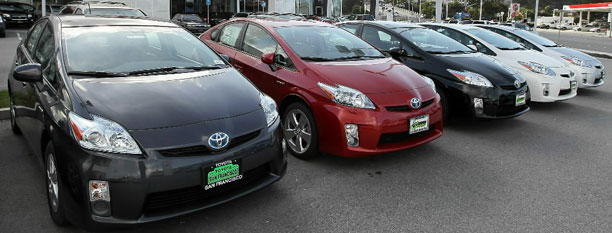A federal jury decided Friday that Toyota Motor Corp. was not negligent in the design of a 2005 Scion, which a New York doctor said caused the vehicle to accelerate unexpectedly and smash into a tree, the automaker said. Get the full story »
Inside these posts: Sudden acceleration
Visit our Filed page for categories. To browse by specific topic, see our Inside page. For a list of companies covered on this site, visit our Companies page.
U.S. finds no defect in Toyota’s electronic throttles

A row of Toyota Prius cars at a sales lot in Daly City, Calif., Feb. 3, 2010. (Justin Sullivan/Getty Images)
A U.S. government investigation showed no link between electronic throttles and unintended acceleration in Toyota vehicles, a victory for the world’s top automaker battered by recalls over runaway vehicles.
The encouraging result for Toyota stems from a 10-month probe ordered by Congress following recalls of nearly 8 million of its best-selling models in the United States over defective floor mats and accelerator pedals that hurt its reputation for quality.
Some safety advocates and congressional investigators questioned whether software-driven throttles also played a role in unintended acceleration complaints. Get the full story »
NASA unlikely to report defects in Toyotas
An investigation into sudden acceleration in Toyota and Lexus vehicles by the nation’s space agency is expected to report Tuesday that no significant electronic defects have been found, though the issue requires continued monitoring, according to automotive electronics and safety experts.
The NASA report was commissioned by the National Highway Traffic Safety Administration after thousands of owners complained that their Toyota Motor Corp. vehicles accelerated unexpectedly, causing dozens of deaths.
The study was launched in March in the wake of three congressional investigations. It is scheduled to be made public at a press conference in Washington.
Toyota awarded $2.6M over whistleblower’s claims
An arbitrator has awarded Toyota $2.6 million in damages against a former in-house attorney who turned into a whistleblower and sued the automaker.
7 insurers sue Toyota over sudden acceleration
Seven insurance companies have sued Toyota Motor Corp. in an attempt to recover money paid to cover crashes they blame on sudden acceleration.
The insurers cite data that blames 725 crashes on the problem and fault the Japanese automaker for failing to equip its cars with an override system that would cause a car to idle if the brake and gas were deployed simultaneously. They are seeking damages in excess of $230,000 from 14 crashes throughout the United States.
NHTSA to look into Accord hybrid acceleration
The National Highway Traffic Safety Administration will decide whether to open a full-fledged investigation into possible acceleration problems with the Honda Accord gas-electric hybrid, according to documents posted on the federal agency’s website Monday.
A woman, who was not identified, filed a complaint seeking an investigation and recall of the 2005 Accord Hybrid after a crash in July 2005 that left her injured and a passenger dead. Several people in other cars were injured, the documents said.
Judge won’t toss Toyota acceleration suits
A federal judge in California says he won’t dismiss lawsuits against Toyota from car owners who claim sudden-acceleration defects caused the value of the vehicles to plummet. Get the full story »
Toyota asks court to dismiss acceleration lawsuits
Toyota Motor Corp. is asking a federal court to throw out lawsuits over acceleration defects in its cars, saying many of the plaintiffs never identified any defect or experienced sudden, unintended acceleration. Get the full story »
Suit: Toyota buried sudden acceleration evidence
Toyota Motor Corp. bought back cars from drivers who reported sudden acceleration defects, but the company didn’t tell federal regulators about it, according to court documents filed in litigation against the automaker.
Plaintiffs’ lawyers contend the Japanese company compelled the owners to sign confidentiality agreements that prevented them from speaking publicly about the issues they encountered. Get the full story »
U.S. probe limits Toyota woes to gas pedals
A government investigation into runaway Toyotas has found no new safety defects beyond problems with accelerator pedals that explain reports of sudden acceleration in the vehicles, according to preliminary findings released Tuesday.
Safety experts have said vehicle electronic systems could be to blame for the problems that have led to Toyota’s massive recalls but the review by the government, while still at an early stage, has not found any evidence of those problems. Get the full story »
NHTSA: Toyota recall probe not done
The government said Wednesday it had not reached any conclusions about whether Toyota drivers may be to blame for their vehicles suddenly accelerating, a problem that has led to millions of recalled cars and trucks since last year.
The National Highway Traffic Safety Administration said in a statement that its engineers were continuing to investigate the possible causes of sudden acceleration in Toyotas along with scientists and researchers with the National Academy of Scientists and NASA. Get the full story »
U.S. study: Driver error in Toyota crashes
The Department of Transportation has analyzed dozens of black boxes in Toyota vehicles involved in accidents blamed on unintended acceleration, finding the throttles were open and the brakes were not engaged, the Wall Street Journal reported Tuesday.
That suggests that drivers of the speeding cars were stepping on the accelerator rather than the brakes. The vehicles investigated came from a sample in which the drivers said they were braking but failed to stop the car before crashing, the newspaper said, citing unnamed sources familiar with the findings. Get the full story »
House scales back auto safety bill
The sweeping legislation that grew out of Toyota Motor Corp.’s sudden-acceleration crisis — heralded as the most important auto safety bill in a decade — has been scaled back significantly in the face of auto industry opposition.
The bill originally gave federal officials the power to levy unlimited fines against automakers for safety violations, which regulators said could have resulted in multibillion-dollar penalties. But the House version now caps fines at $200 million.




